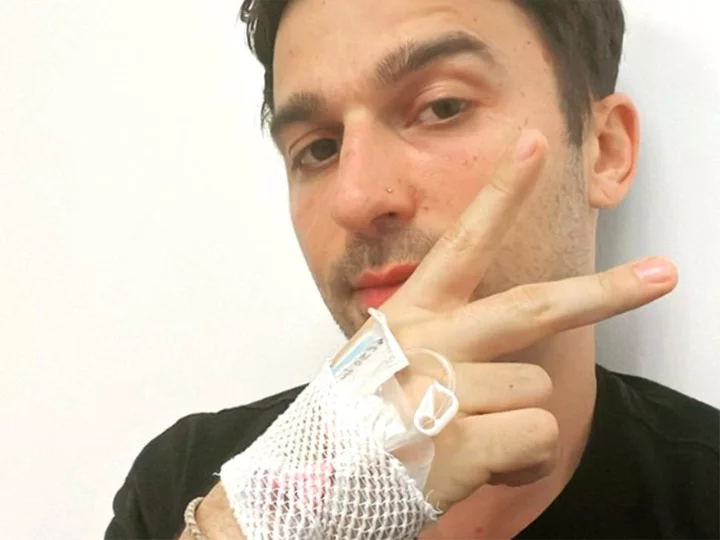
DJ Michael Bibi diagnosed with rare brain and spinal cancer
DJ Michael Bibi has revealed that he has been diagnosed with a rare form of brain and spinal cancer that is “moving fast”. The 32-year-old producer opened up about the diagnosis in a new Instagram post, more than two weeks since he last posted about discovering he had a “neurological problem” after a check-up for his tinnitus. Bibi, one of the most popular DJs in the UK’s dance music scene, told fans he has been diagnosed with primary central nervous system (CNS) lymphoma. He posted a selfie showing a peace sign with a cannula in his hand on Monday night (5 June) and wrote: “Writing this post is a hard one. Last week I was diagnosed with CNS lymphoma. A very rare cancer that affects the brain and spine. “Unfortunately it’s moving fast and I have to stay in hospital starting treatment immediately. Typing this message doesn’t quite seem real and I’m sorry for the bad news. “I don’t know what lies ahead,” he continued. “I’m tired but I know I am strong and I won’t let this beat me. I will be back stronger for you all. Love Bibi.” Bibi was set to play at Manchester’s Parklife festival and Glastonbury this summer. It is unclear if he will be able to perform. Fellow DJs and others in the music industry sent him well wishes, including Steve Aoki, Paris Hilton, Tiesto and the electronic duo, Disclosure. Hilton wrote: “Sending you lots of love and light. Love you.” Aoki added: “Positive energy and healing to you legend. You’ll get through this.” His record label Solid Grooves also posted on Instagram in support of the founder, including a series of photographs of Bibi performing various DJ sets. It said: “The entire Solid Grooves team sends our love and support while he recovers, and we hope to have him back with us as soon as possible to make more memories.” According to Cancer Research UK, only two in every 100 brain or spinal cord tumours are lymphomas. Symptoms can include headaches, blurred vision, personality changes, seizures, and difficulty walking and balancing. Lymphoma means the cancer began in the lymphatic system, which is a system of thin tubes and lymph nodes that run throughout the body. Most lymphomas of the brain start in the front section of the brain but can also start in the spinal cord, eyes and layers of tissue that surround the organ. Read More Fitness fanatic, 26, diagnosed with stage 4 cancer after feeling dizzy Husband of non-smoker, 24, who died two weeks after lung cancer diagnosis reveals single telltale sign Sarah Beeny: Why I’m no longer scared of cancer My child is vaping – how bad is it? ‘Covid killed my taste buds – then my business’ Gemma Collins blasted for promoting headset as ‘magic’ cure for depression
1970-01-01 08:00
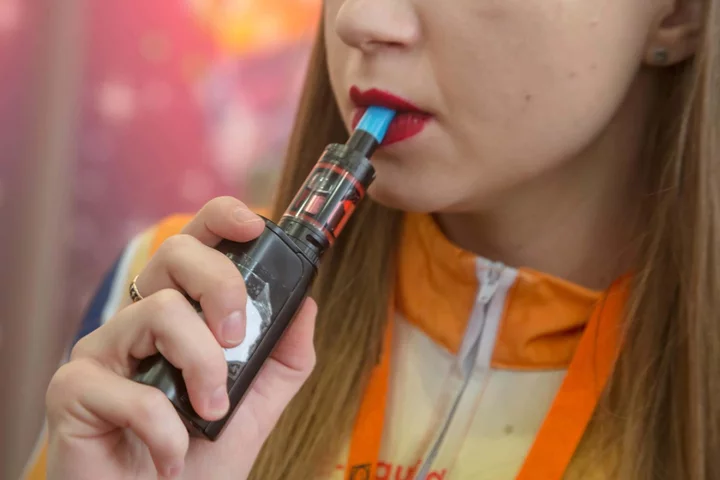
My child is vaping – how bad is it?
Paediatricians have warned vaping is “fast becoming an epidemic among children” and are calling for disposable vapes to be banned. Many parents may be concerned about their own child’s health if they’re vaping. In May, Action on Smoking and Health (ASH ) warned there had been a 50% rise in the proportion of children vaping – from 7.7% of 11 to 17-year-olds trying e-cigarettes last year to 11.6% this year. And because vapes haven’t been around long (they’ve only been on sale in the UK since 2007) there haven’t been any long-term studies on the effect on health, and particularly on young lungs, hearts and brains. However, responding to a current Government consultation on e-cigarettes, the Royal College of Paediatrics and Child Health (RCPCH) has warned e-cigarettes “are not a risk-free product and can be just as addictive, if not more so than traditional cigarettes”. The RCPCH’s vice president for policy and paediatric respiratory consultant, Dr Mike McKean, says: “Without a doubt, disposable e-cigarettes should be banned. Youth vaping is fast becoming an epidemic among children, and I fear that if action is not taken, we will find ourselves sleepwalking into a crisis.” But it’s a crisis many parents are ill-informed about – so here’s what the experts think parents should know… What are vapes?Hazel Cheeseman, deputy chief executive at ASH, describes vapes – also known as electronic cigarettes – as “a battery-powered heating element which heats a liquid – generally containing nicotine and other ingredients – that’s then inhaled as a vapour by users”. Some vapes are single -use and come in bright packaging, with exotic flavours and enticing, sweetie-type names like strawberry ice cream, cotton candy and cherry cola, others are rechargeable. Can children buy vapes? It’s illegal to sell vapes to under 18s in the UK. However, youngsters are clearly still getting their hands on them. McKean, who practises in the north-east of England, says he’s concerned to hear there’s been an increase in unregulated e-cigarettes hitting the UK market recently. He points out that in the north-east alone, more than 1.4 tonnes of illegal e-cigarettes – which Trading Standards said were often indistinguishable from regulated products – were seized from shops in the second half of last year. “It’s impossible to know what these products contain or how they might impact young people’s health,” he says. “The thought that these products are ending up in the hands of children is terrifying.” What do they contain? The crucial thing for parents to know is that they contain nicotine, which is harmful and addictive. Gurch Randhawa, professor of diversity in public health and director of the Institute for Health Research at the University of Bedfordshire, says: “E-cigarettes do not burn tobacco and do not produce tar or carbon monoxide, the most harmful aspects of smoking cigarettes. E-cigarettes typically contain nicotine, propylene glycol, vegetable glycerine, and flavourings.” Are they addictive? Yes. McKean warns: “Vaping is far from risk-free, and in many cases can be very addictive.” Cheeseman adds: “It appears likely that people who have not smoked can become addicted to nicotine through vaping”. What are the health impacts long-term? Randhawa says that because vapes are a relatively new product, evidence on their health impacts isn’t clear. Experts are concerned though – especially because people under the age of 18 are still developing. Nicotine is known to cause an increase in blood pressure, heart rate, flow of blood to the heart and a narrowing of the arteries.Cheeseman says: “We don’t know what the health implications will be long-term. It seems likely there will be some, but until we have a population of people who have exclusively vaped without smoking for many decades it will be difficult to fully assess the impact.” Decades ago, no one knew about the devastating health impacts of smoking either. How can parents help children quit? Ensure your child has all the correct information and risks associated with vaping. Rather than setting strict punishments, try to be understanding and have a gentle discussion about peer pressure and having the confidence to say no. Cheeseman says nicotine replacement therapy can be used for children as young as 12. Randhawa points out that e-cigarettes should only be used to help people stop smoking. “If you haven’t smoked, you should not use e-cigarettes, as they contain nicotine, which is addictive. This message needs to be understood and articulated across society and schools to support children to not take up vaping.” Read More Charity boss speaks out over ‘traumatic’ encounter with royal aide Ukraine war’s heaviest fight rages in east - follow live Leah Williamson’s first fiction book inspired by women’s football ban protest Love Island 2023: Is having a ‘type’ holding back your dating life? 8 home repair jobs to tackle quickly – before they cost you a fortune
1970-01-01 08:00
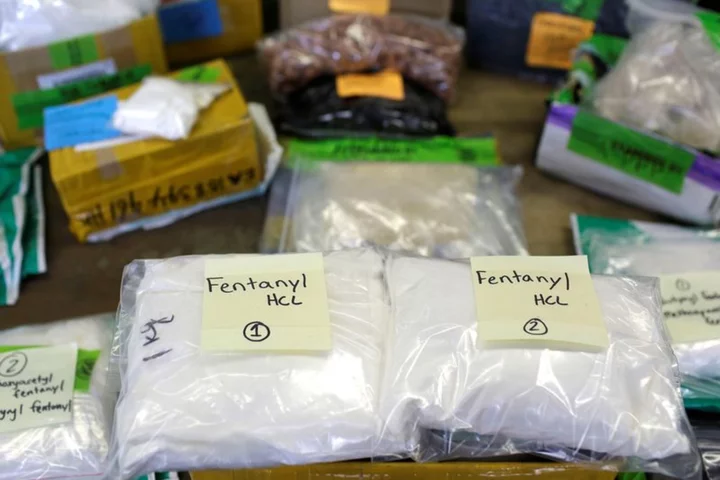
White House vows an improved effort against drug overdoses
By Nandita Bose WASHINGTON President Joe Biden's administration on Tuesday pledged an improved effort to combat drug overdoses
1970-01-01 08:00
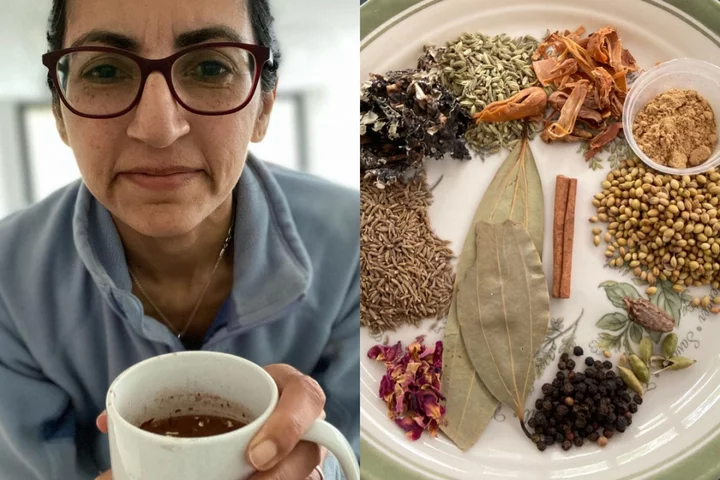
‘Covid killed my taste buds – then my business’
A cooking teacher who lost her sense of taste and smell and “never fully recovered” after catching Covid last summer has decided to shut her business because she can no longer gauge the quantity needed or quality of ingredients in her dishes. Raisa Ali, 51, said to continue teaching people how to cook Indian food would be like “the blind leading the blind” as her sense of taste and smell have never been the same since she caught Covid in July 2022. The mother-of-three, who lives in Kingston, south London, knew “something was missing” after her husband Akbar, 52, and her students found she was being heavy-handed with the spices but could not tell the difference. Raisa made the difficult decision to close her Sweet Sultry Spice cooking school after teaching a class how to make the Indian spice mix garam masala and realising that, while she knew the recipe from memory, she could not smell the pungent ingredients. Covid has “killed the joy of cooking” and dried up her source of income, but Raisa has now accepted what happened and is looking for a fresh start. Raisa, who has three sons, twins Zain and Zakir, 16, and Yusuf, 19, said: “I can’t dwell on this anymore and just have to move forward. “My main mode of cooking and learning and teaching has been to follow my nose. “I used to make my students take whiffs of everything at every stage. “I decided to close the school because when I lost my sense of taste and smell, my passion died. “Covid killed the most important part of food for me.” Raisa started giving cooking classes in her kitchen after completing a nutrition course in 2018 and taking advice from a friend. “I did a one-year nutrition course and started working online, trying to build a small business, but it wasn’t going anywhere and I was feeling very isolated,” she said. “A friend of mine came over and said ‘you’re doing it all wrong, why don’t you just open a cooking school’. “I was scared but she was like ‘feel the fear and just do it anyway.” She soon found herself giving two or three classes per week to groups of around five people for between £60 and £70, teaching them to cook Indian cuisine. “People would come over to my house and they wouldn’t leave – it was great,” said Raisa who moved to the UK in 2008 after her husband was transferred to the country for work. “It was a really great experience and then when it went away, I just thought now what am I going to do?” Just when her budding business started taking off, bringing in between £500 and £800 per month, Covid struck. “Suddenly Covid’s happening and from one day to the next the business totally died,” she said. “The income that I had was gone and everything that I had built was gone. “I spent that first year (2020) feeling sorry for myself.” Then while travelling back to her native California, in July 2022, Raisa caught Covid and spent two weeks in bed. “I spent the first two weeks in bed and then started to recover slowly,” she said. “When I came back, I had brain fog, I couldn’t smell things properly and I couldn’t taste things properly.” She noticed her taste buds were not firing on all cylinders after eating some tortilla chips which tasted like “cardboard”. “I’m eating them and thinking, I don’t understand, what is this?” she said. “And it has just never come back properly.” While Raisa started to recover after spending two weeks in bed, some of her symptoms lingered for months. Once lockdown rules lifted, Raisa went back to giving cooking classes, but it was not the same. In January 2023, while teaching a group how to make garam masala from scratch, Raisa’s sense of smell was put to the test. “When they could smell it across the room then I knew, at that point, that this wasn’t going to work for me because it would be like the blind leading the blind,” she said. “I remember telling my customers, look I’m telling you everything from memory and my past experience because I don’t have have my sense of taste and smell. “Isn’t that depressing?” On another occasion, she was cooking a chicken dish and a student asked about the ingredients but Raisa could not “taste anything”. “It turned out it was black pepper but I couldn’t even taste it,” she said. Her husband and children also started picking up on strong flavours which appeared relatively mild to her. “I knew something was missing because when I cooked things for my husband he would say ‘oh, you put a lot of this in’,” Raisa said. “But I could not tell the difference.” Even to this day, Raisa says she has not fully recovered her sense of taste and smell. “If I would sum it up, Covid killed the joy,” she said. “I just feel like I don’t want to bother anymore because I feel like my drive is gone. “So I decided, either I can be upset about it or I can reinvent myself again.” Raisa has decided to see her Covid nightmare as a positive step towards new beginnings. “If you are cooking something, you have to be able to smell and taste the ingredients and I knew I couldn’t do that so I decided it was time for a complete shift,” she said. She has not been to see a doctor about her long-lasting symptoms as she believes there are many other people who are “far worse off” and that the NHS already has “too much on its plate”. She is now looking to explore other business opportunities which do not rely on having a sense of taste and smell. “Sustainable living” is one area in which Raisa is particularly interested, but what this will look like in practice remains to be seen. “I want to get rid of my carbon footprint,” she said. “I don’t need to prove anything to anyone, it’s just what I want to do.” For more information about next steps, follow Raisa on Instagram. Read More Covid Inquiry could see unredacted Johnson WhatsApp messages despite legal clash I decide what’s relevant, says Covid inquiry chair in Boris WhatsApp row Covid Inquiry head making ‘no comment’ on legal row over Johnson messages Charity boss speaks out over ‘traumatic’ encounter with royal aide Ukraine war’s heaviest fight rages in east - follow live
1970-01-01 08:00
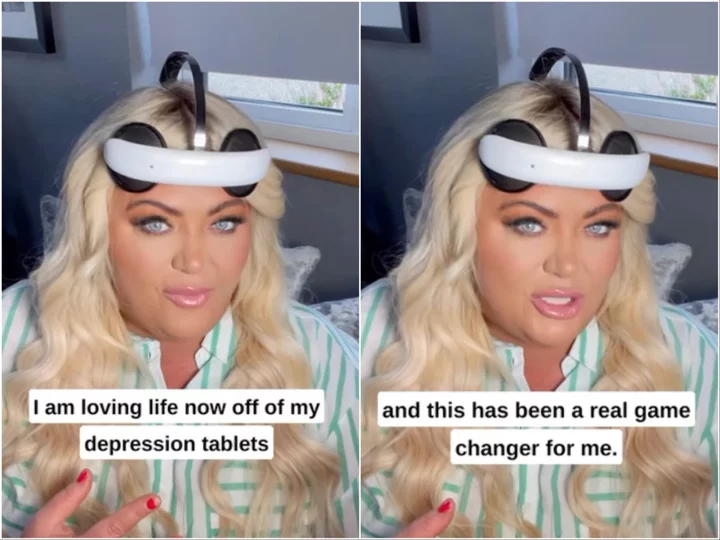
Gemma Collins blasted for promoting headset as ‘magic’ cure for depression
Gemma Collins has been criticised by her followers for using misleading wording in an advert for a “medication free” headset, which is apparently used to treat depression. The TV star and presenter, 42, who is best known for appearing in realty series The Only Way Is Essex, shared a video of her wearing the Flow Neuroscience Headset, telling her followers that she had been using the product for one week and was already feeling “lighter” and “brighter”. In the caption she wrote: “According to Flow’s data it reduces depression in 88 per cent of people. And the NHS are trialling it too.” She finished the caption with “#ad” to indicate that she was asked to promote the product. The Independent has contacted Collins’ representatives about the terms of the advert. In the video, Collins told the camera the product is “literally amazing”. “I am loving life now off of my depression tablets. This has been a real game changer for me,” she said. According to Flow, the headset sends a “small electrical current” to “the left dorsolateral prefrontal cortex”, which causes “neurons to fire more frequently, strengthening the neural pathways in the prefrontal cortex”. Collins continued: “Flow is a new medically approved depression treatment. It focuses on the front cortex of your brain. This ultimately helps you to relax and it also helps to remove negative depressive symptoms.” “For people that can’t get access to therapy, or don’t want to be on antidepressants, they have a new option which is Flow.” “Flow actually works faster and better than antidepressants,” she claimed in the video. “It’s like having your own therapist in the comfort your own home and you’re fully in control of your own treatment.” She concluded that using Flow would be “the best thing you do”. Social media users have been criticising Collins’ messaging in the post, arguing that she is promoting the product as a “quick fix” for depression and encouraging people to stop their medications without first consulting a medical professional. “People PLEASE speak to your medical team before stopping any medications,” one person urged in the comments section. Another pleaded to Collins: “Please don’t promote people just abruptly coming off their medication !!” Others remarked that Collins had not linked to any scientific research to support her claims, or given insight into how the product actually works. A representative for Flow Neuroscience told The Independent that it is “very clear” on its website that anyone with depression should “always speak to their doctor first before trying new treatment”. The statement continued: “At a time when society is attempting to remove the stigma associated with mental health – people like Gemma are helping enormously by being open and transparent about their own mental health journey.” “Gemma has struggled for years on antidepressants, and it’s brilliant that she is now having this positive experience using Flow.” The spokesperson added that Collins’ posts are a “reflection of her own personal experience” and the post had not been “edited or scripted” by Flow. Collins has previously said that the side effects of using antidepressants have not worked for her, which drew her to using the headset. Flow’s spokesperson also said that the company’s mission is trying to “increase accessibility” to mental health treatments. At present, the headset does not require a prescription before use and is available to purchase online. The company says that “83 per cent of its users reported improvement in their symptoms within 21 days” and that less than two per cent of its users on its database reported minor side effects, which are “typically mild irritation of the kind and mild headaches”. It added: “We believe the Flow platform is an important tool in this process, but it has never been our intent to present Flow as a quick fix or magic bullet.” Read More Prince Harry court – live: Duke of Sussex stokes political storm by slamming ‘rock bottom’ government Ioan Gruffudd’s 13-year-old daughter ‘files restraining order against him’ Busy Philipps calls out Leonardo DiCaprio for ‘dating’ model who looks like her teen daughter Gemma Collins says she wouldn’t ‘need to’ consider surrogacy Fitness fanatic, 26, diagnosed with stage 4 cancer after feeling dizzy The telltale sign of lung cancer everyone should know
1970-01-01 08:00

Pope Francis goes to hospital for check-up - Italian media
ROME (Reuters) -Pope Francis has gone to Rome's Gemelli hospital for a check-up, news agency Ansa and several other Italian
1970-01-01 08:00

Apple WatchOS 10 Will Bring Widgets, Snoopy Comics to Your Watch Face
Widgets, and the beloved beagle Snoopy, are headed to your Apple Watch face. At its
1970-01-01 08:00

General Electric to sell over $2 billion stake in GE HealthCare
General Electric Co is offering 25 million of common stock, or over a $2 billion stake, in GE
1970-01-01 08:00
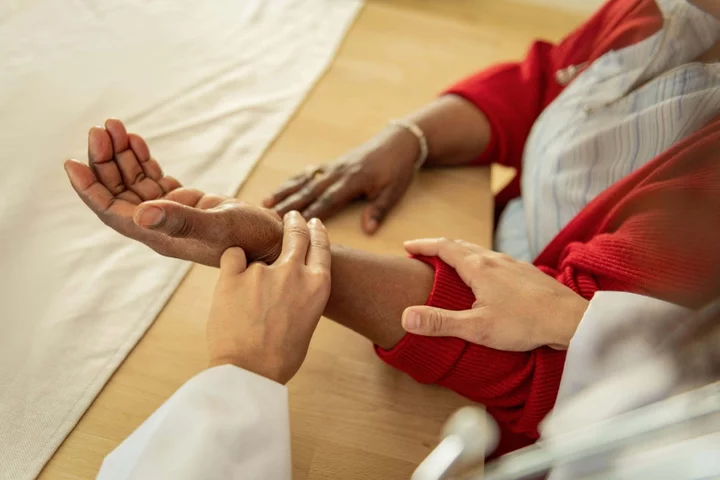
World Heart Rhythm Week: Could you have an abnormal heart rhythm?
It’s believed around three million Brits have an abnormal heart rhythm or arrythmia – and many may not even realise it. The most common arrhythmia is atrial fibrillation (AF), which causes an irregular and often unusually fast heartbeat, and is associated with a five-times higher risk of having a potentially fatal or life-changing stroke. If diagnosed, AF can be treated – however, it’s estimated there are at least 270,000 people in the UK who are unaware they have the condition, according to the British Heart Foundation (BHF). “What remains troubling is the sheer number of people who are undiagnosed and unaware that they are living with a heightened risk of stroke,” says BHF medical director, Professor Sir Nilesh Samani. “Finding people with this hidden threat must remain a priority.” Trudie Lobban, founder of the Arrhythmia Alliance – a coalition of patients, healthcare professionals and policymakers, adds: “Heart rhythm disorders are a leading cause of sudden cardiac death and devastating strokes, and yet too few people are aware of the rhythm of their heart.” To mark World Heart Rhythm Week (5-11 June), experts are highlighting the importance of being aware of arrhythmia warning signs and getting things checked out. Here’s what you need to know… Arrhythmias can affect all age groupsHowever, AF is most common in older age groups. As Dr Anthony Chow, a consultant cardiologist at The Wellington Hospital, part of HCA Healthcare UK, explains: “Heart rhythm problems are a very common condition that can affect all age groups, but AF is more common in older people. It can be as common as 10% of the population in their 70s, and almost 29% of those in their 80s.” Arrhythmias can have many causes Lobban says many conditions can cause heart rhythm problems, including heart failure, blackouts, electrolyte disturbances, thyroid disorders, infections, heart attacks, strokes, cardiomyopathy, high blood pressure, sleep apnoea and obesity. Triggers can also include stress, caffeine, tobacco, alcohol, diet pills, and cough or cold medicines. “But there is usually an underlying physical reason for it,” Lobban adds. Warning signs to look out for Key warning signs, says Chow, are palpations (a thumping or fluttering sensation in your heart/chest), dizzy spells and feeling faint, breathlessness, chest discomfort, and feeling overly tired. These things don’t automatically mean you have a heart problem, but it’s important to get any symptoms checked out. And Chow adds: “Not everyone experiences these exact symptoms and, in some cases, patients can experience no symptoms at all.” How to measure your heart rhythmThere are many ways heart rhythms can be measured clinically, through ECGs or monitors. You can check your pulse yourself at home, too. “The easiest way to detect an arrhythmia is to feel your pulse and hence your heart rhythm – is it irregular, too fast, or too slow?” says Lobban. “Such a simple thing as a 30-second pulse rhythm check can literally save your life.” The Heart Rhythm Alliance has a ‘know your pulse’ guide on their website. Lobban says you should sit down for five minutes beforehand, and remember that any stimulants you’ve taken, like caffeine or nicotine, will affect the rate. You’ll need a watch that measures seconds (take it off to do the test), or your phone timer could work. Hold your left or right hand out with your palm facing up and elbow slightly bent. With your other hand, place your index and middle fingers on your wrist near the base of your thumb, between the bone and stringy thumb tendon, to find your pulse. Once you’ve found your pulse, maintain a firm pressure and count the beats for 30 seconds, then multiply by two to get your heart rate in beats per minute. If your heart rhythm is irregular, you should count for one minute and don’t multiply. Arrhythmia can cause many serious health problemsHeart arrhythmia can cause a variety of serious heart health complications including strokes, heart failure and heart attacks, explains Chow. “Heart arrhythmias, in particular AF, are often associated with an increased risk of blood clots, so it’s extremely important to be aware of the warning signs,” he says. “If a blood clot breaks loose, it can travel directly from the heart to the brain, which can cause a stroke. You should consult your doctor and get referred to a cardiac rhythm specialist for assessment if you have significant symptoms.” When to see a doctor If you have any previous history of heart problems and/or are becoming increasingly concerned about palpations, you should speak to a medical expert, Chow advises. Those with a family history of arrythmia and/or sudden cardiac death should also make sure they get checked out. “It’s not usual that we’re aware of our heart beating, unless there’s a disturbed rhythm,” he says. “You should speak to your doctor if your heart palpations are lasting a long time, or aren’t improving and seem to be getting worse. Acute instances of symptoms could be a warning sign of something more serious, so it’s important to seek medical advice if you’re concerned. In some cases, arrhythmia could be an indication of a medical emergency such as a heart attack.” Treatment for arrhythmiaArrhythmias can be treated in a variety of ways. “Some require no more than reassurance after diagnosis, but others may need drug therapy, or implantation of an electrical device such as a pacemaker or ICD,” says Lobban. Chow says therapies such as cardioversion can be used to reset the heart rhythm by sending a shock through the chest to the heart, and there are also procedures and surgeries including catheter ablation, where wires are threaded through blood vessels directly to the heart and heat is used to create tiny scars in the heart to block abnormal electrical signs and restore a normal heartbeat. Chow adds: “Most people with abnormal heart rhythms can lead a normal life when the condition has been properly diagnosed and managed.”
1970-01-01 08:00

Man spends £86,000 lengthening his limbs
A father-of-two has had limb-lengthening surgery to increase his height from 6ft to almost 6ft 7in after deciding his legs were “too short” for his body, and hopes to feel “on top of the world” once the £86,000 (USD $106,000) procedure has fully healed. Brian Sanchez, 33, a mortgage broker who lives in Georgia in the United States with his wife, Nidia, 30, and their daughters, Kaisley, two, and Kairi, six, felt in January 2022 that his body was “out of proportion” and he looked like “like a huge thumb”. After some research, he discovered he could have limb-lengthening surgery in Turkey to become his ideal height and as soon as he saw it he thought: “OK, I guess this is what I’m doing.” Brian’s main reasons for wanting the surgery were not only for his physical appearance but also to improve his weightlifting goals in the gym and be around nine inches taller than his wife so they will no longer be at “almost eye level”. When he told his loved ones about his plans, they thought it was “typical of (him)” as just because “something is crazy it never means that (he) won’t do it”. Brian had his first operation in December 2022, which involved breaking his tibia and fibula, putting a rod inside the bones, and fastening it with screws. He underwent a second procedure in March 2023 to extend his femur. To recover, Brian had to be in a wheelchair and turn the screws with an Allen wrench four times a day, but when he is fully recovered he thinks the pain will have been “worth it” as he will be able to “enjoy being taller”. “My wife is pretty tall – we were only about three inches apart – but once I’m fully recovered it’ll be a nine-and-a-half-inch difference,” he said. “It’s going to be really nice just to be able to hug her and have her all the way down there on my chest instead of being almost eye level. “One of the things that I’ll enjoy the most is being able to work out again and put some weight on my legs and have my body look a little bit more how I want it to.” In January 2022, Brian suddenly realised his legs didn’t match his “torso proportions”. He said: “I realised that my legs were always looking weird, and I didn’t know what it was, until one day I was sitting next to my brother-in-law who is almost 6ft 6in, and I was actually a little taller than he was. “I thought that was weird, because I knew he was taller than I am by a lot, and we stood up, and all of a sudden, I started looking and realised my legs were too short for my body. “I’m broad, have long arms, and I’m wide, but my short legs make me look different – I almost look like a huge thumb, like those thumb men from Spy Kids.” After the realisation, Brian, who had never previously had cosmetic surgery, started to “not like (his) aesthetics” and decided to research ways to make himself taller. He said: “I thought I can either find a new hobby, and give up lifting weights, or I can fix the issue. “I started Googling and ran into the procedure from there – as soon as I saw it, I thought ‘OK, I guess this is what I’m doing’.” Brian set himself a goal of becoming at least 6ft 6in tall and said of his loved ones’ reaction when he told them about his idea: “It was a combination of disbelief, but they also said that it is typical of me. “I know this is a very crazy thing, it’s extremely expensive, time-consuming, difficult, painful and even risky in some respects.” In December 2022, he had his first operation in a clinic called Live Life Taller in Turkey, which cost him £30,000. The first procedure involved lengthening the tibia and fibula together. “In the first surgery, they broke my tibia and fibula and hollowed out the inside of the tibia, taking out the bone marrow,” he said. “They then put a rod inside the bone and fastened it with screws and attached the bone segments via pins to external fixators – so you have this piece of steel on the outside of your legs and have these constant open wounds that won’t close until you remove all the hardware.”. His recovery involved being in a wheelchair and using an Allen wrench to turn a bolt on the fixators four times a day at 90 degrees to separate the bone segments a little at a time. Brian continued to do this every day for two months, saying of his painful recovery: “The hardest part of the whole thing was the lack of sleep, but I think the pain will be worth it – once it’s all finished I’ll just be able to enjoy being taller, and hopefully feel on top of the world.” In February 2023, the external fixators on his tibia were removed and he was around three inches taller. In March 2023, he had the second operation, which cost him an additional £56,000, to carry out the same procedure on his femur. He said: “I actually felt great after my femur procedure, and there was almost no pain throughout the entire process, only from lengthening from actually stretching my legs.” Now, Brian is just over an additional three-and-a-half inches taller – making him just under 6ft 7in – but is still in a wheelchair and is waiting for it to be completely healed. He joked: “When it’s fully healed, I’m trying to not have expectations because I don’t want to be disappointed but it’s hard to imagine that I’m not going to enjoy it. “From the few times that I’ve already stood up, it is bizarre to see people that used to be my height come up to under my nose – it’s really weird, and it’s a lot of fun just seeing the world in a slightly different perspective. “I can see above the fridge more easily – not that it’s that important, but it’s cool. I’ll be able to see other people’s bald spots, everything will be just different.” Looking back on his decision to undergo the surgery, Brian said: “I didn’t need to do this procedure, but I really wanted to, and I didn’t know how hard it would be. “So, when I made the decision to do it, I kind of over-estimated how easy it would be and under-estimated how much pain and how much difficulty would be involved. “I don’t regret my decision, and I hope that I’m going to be really happy with the results.” Read More The worst day of the week for heart attacks revealed Husband of non-smoker, 24, who died two weeks after lung cancer diagnosis reveals single telltale sign A Place In The Sun’s Jonnie Irwin admitted to hospital amid terminal diagnosis Triathlete shares race photo where she bled through swimsuit while on her period The telltale sign of lung cancer everyone should know A Place In The Sun’s Jonnie Irwin admitted to hospital amid terminal diagnosis
1970-01-01 08:00

10 of the best affordable gifts for dads of all ages
Because he’s worth it – make your dad feel like the champ he is with a little something to go with the Father’s Day card…. 1. Hotel Chocolat Father’s Day H-Box, £14.95, Hotel Chocolat From Champagne Truffles to Going Nuts and Mousse au Chocolat, these decadent chocs are bound to delight. 2. Gentlemen’s Hardware Beard Survival Kit, £20, John Lewis Best beard grooming begins with the essentials: a nourishing beard wash, scented beard oil infused with an earthy Oak Moss fragrance (worth a kiss), and an angled wooden beard comb to keep everything just so. 3. M&S Collection Personalised Cotton Poplin Baseball Cap, £19.50, Marks & Spencer With the option of three initials, this personalised baseball cap will definitely get his seal of approval. Cuts out glare as well as giving protection from the sun’s rays. 4. Rainbow Toast Wonderful Dad ½ Pint Mug, £16.10 (was £23), Emma Bridgewater Job done… when it’s finally his turn to kick back and relax, a rewarding cuppa will taste that much nicer when he’s reminded by ‘loving’ wording: Bad Jokes, Terrible Dancing, Wonderful Dad – on the front; Flustered Chef, Sports Addict, Kind Taxi Driver – on the back; and most importantly, Love You Dad – inside. 5. LEGO Speed Champions 007 Aston Martin DB5 (76911), £20, Moonpig Car fanatics and Bond fans will be onto a winner with this No Time To Die model kit. Special features include James Bond mini-figure, swanky silver-coloured wire alloy wheel inserts and four sets of interchangeable number plates from different Bond movies. 6. Arber Eau de Toilette, £20, (100ml), The Body Shop Give him the gift of a gorgeous fragrance with top woody notes, core of coriander and mint, and a touch of citrus to stir the senses. 7. Three Pack BBQ Socks Set, £15, FatFace One for the BBQ King, those marinades and burgers will taste that much more delicious when he dons these sizzling socks. 8. Just Spices Gin-Making Kit, £49.99, Just Spices With gin palaces in season, surely the best way to spice up his G&T is with a bunch of botanicals he’s tailored himself. Includes equipment, spices and creative recipes. 9. Molton Brown Re-Charge Black Pepper Infinite Bottle, £40, (400ml), Molton Brown Enriched with brilliant refreshing benefits, this woody-citrus body wash marries heated black pepper, woody coriander and earthy vetiver for a power shower. As an added bonus, the bottle can be topped up with a waste-reducing refill pouch when he’s reached the last drop. 10. Black Flag Selection in Father’s Day Gift Box, £43.99, Virgin Wines Featuring three bonzer wines from top regions Down Under, you can’t go wrong with these labels to love. Think a rich, round Barossa Valley shiraz cabernet, a smooth Adelaide Hills shiraz, and refreshing sémillon with delightful lemony notes to perk up his palate. Read More Charity boss speaks out over ‘traumatic’ encounter with royal aide Ukraine war’s heaviest fight rages in east - follow live Top tips to avoid garden injuries Planning an LGBTQ+ wedding? Why inclusivity can be a driving factor for couples Amanda Holden’s most extravagant fashion from the BGT live shows
1970-01-01 08:00

Al Roker shares health update after second knee replacement surgery
Al Roker has undergone his second knee replacement surgery, which had to be delayed after he was admitted to hospital for blood clots in his legs and lungs last December. The Today show weatherman, 68. has been reporting on the weather for the NBC morning show since 1996. Following his surgery, he returned to the programme on Tuesday (30 May). Roker has now said he is feeling “good” after the surgery on 9 May, which comes more than a year after his first knee replacement. He attended the Veuve Clicquot Polo Classic event in New Jersey with his wife Deborah Roberts over the weekend, which he said was his first public outing since the surgery apart from work. Speaking to People, Roker said: “[It’s] nice to be wearing nice clothes. Here we are. You can’t help but feel better.” Roker was rushed to hospital the day after Thanksgiving and remained there for nearly two weeks due to the blood clots. He told his followers on Instagram that he was admitted “with a blood clot in my leg which sent some clots into my lungs”. “After some medical whack-a-mole, I am so fortunate to be getting terrific medical care and on the way to recovery,” he said, thanking fans for their well wishes. In March, Roker said he “wouldn’t be alive” if not for Roberts, 62. He told PageSix: “I guess I know it now. I didn’t know it at the time. Deborah was great at keeping all that away from me so I thought I was doing OK but that was great because I was able to focus on getting better.” Roberts is the presenter’s second wife, who he married in 1995 after splitting from ex-wife Alice Bell the year before. He shares daughter Courtney, 35, with Bell, and two children Leia, 24, and Nick, 20, with Roberts. Read More Jessie J confirms identity of her baby’s father after ‘struggling to keep things private’ Husband of non-smoker, 24, who died two weeks after lung cancer diagnosis reveals single telltale sign How noise complaints became a very British obsession Pharmacist warns against one common hay fever habit 7 tips and tricks for hay fever relief A Place In The Sun’s Jonnie Irwin admitted to hospital amid terminal diagnosis
1970-01-01 08:00
